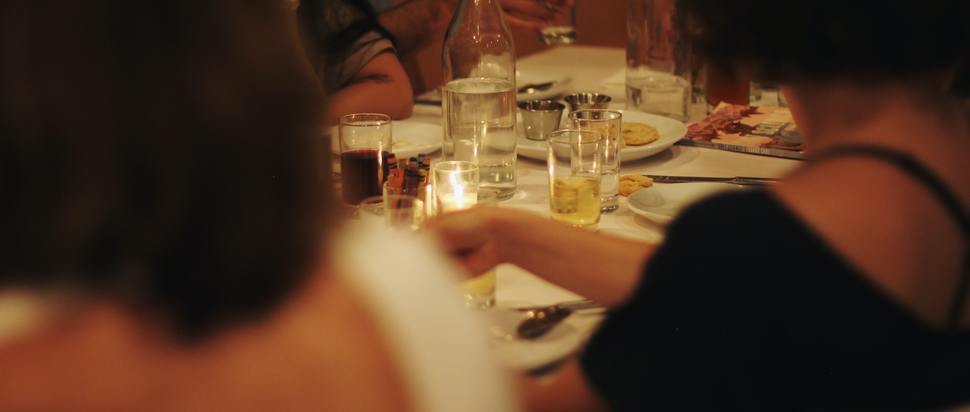A Meal Shared: How food can form friendships
University can be lonely – but food can bring us together. One writer reflects on the power of communal cooking
The first few weeks of the semester were bleak. I had imagined myself making new friends each meal time in my hall’s cafeteria; not nibbling on a cereal bar, alone in my room. I couldn’t find any place where I felt comfortable. Every conversation felt forced. Every dull overpriced coffee with a stranger left me aching for familiarity and intimacy. I was desperate to forge a connection with anyone that I met. To make matters worse, my halls of residence were catered and each day, hundreds of students would file into the dining hall for breakfast and dinner. The act of eating had never been such an event. Stumbling into the canteen for breakfast in the morning, bleary eyed with crusty mascara streaked down my face, I would be confronted with crowds of perfectly put together people, who all just seemed to adore each other already. And then there was the food. Dry, stringy, wet, clumpy and congealed. Day after day, an assortment of unappealing textures and bland flavours were lumped onto our plates. It didn’t take me long to associate the miserable food with my loneliness. Despite eating in a packed room each day, I had never felt more isolated.
In the middle of term, I met a Pakistani postgraduate student. She was warm and generous, immediately inviting me to an all-Pakistani dinner she was hosting that night. I went with some caution; my halls were populated by posh white English students from the home counties and I wanted to fit in with them. Although curry is a national favourite, all too often Brown people are mocked for smelling of the food that they cook at home. The heady mix of fried chilli, garlic and ginger can settle into your hair, skin and clothes for hours. Back home, amongst a diverse community of friends, the smell of South Asian food did not distinguish me as anything other than myself. Here, I didn’t want to bring that tell-tale aroma back to my halls, to reinforce my difference. But I was hungry, and so I went along.
There were about twenty of us and we decided to make chicken biryani. We started peeling and chopping onions, garlic and washing rice. We discovered we didn’t have all the spices we needed, so a small group went to a local South Asian grocery store. I had seen this store on campus, but the shame of popping in for a quick samosa versus ducking into Sainsbury’s for a bland meal deal like everyone else was overwhelming. When I walked in, it felt like coming home. Rows upon rows of spices, dried herbs and pickles – all the ingredients I understood.
Later, conversation flowed easy as we prepared the meal. The act of cooking together dissipated all unfamiliarity. We bickered over which spices should be thrown in, debated how often the rice should be stirred and giggled together as our eyes streamed from chopping mountains of onions. When the biryani was cooked, we truly ate together, murmuring softly in appreciation. Finishing our plates, we talked over what had worked and what could have been done better. I felt full. As I left, I felt a sense of emotional nourishment too. I had unwittingly stumbled upon one of the most enduring and profound truths: that food is our ultimate source of connection. In the past, I had understood food as a means of basic survival and organising a social calendar: hangover breakfasts, family lunches, potluck dinners. But the act of actually both cooking and eating with people had been lost on me. Shared meals cooked together could become memories, the foundation for my friendships.
Three years along, and I moved into a flat with three strangers in a student co-operative. My flat has a long-established communal cooking culture, and so I slotted into that arrangement with ease. Each time it was my turn to decide what to cook, I brought parts of culture, community and upbringing to the table: potato and chickpea curry, daal, pistachio and saffron tart and masala roast potatoes. Equally, I understood aspects of my flatmates through rolling out their sheets of pasta dough or stewing their foraged fruit. The insider-outsider, foreigner-native paradigms became broken.
Last week, my flatmate Clara was visiting her grandma in Germany; she sent me a picture of the tomato, coconut and tamarind curry that she had cooked after learning it from me. I like to think that after tasting the curry, her family know a little bit about me, and that when I visit her family home in a few months, we will now have things (or foods) to talk about.
Nobody is a stranger for long when they are covered in flour or speckled in tomato sauce. It has become a way to invite other people to actively participate in my culture with me, and for me to participate in theirs. Food – and university – is a lot less lonely now. We all just want a good meal.
